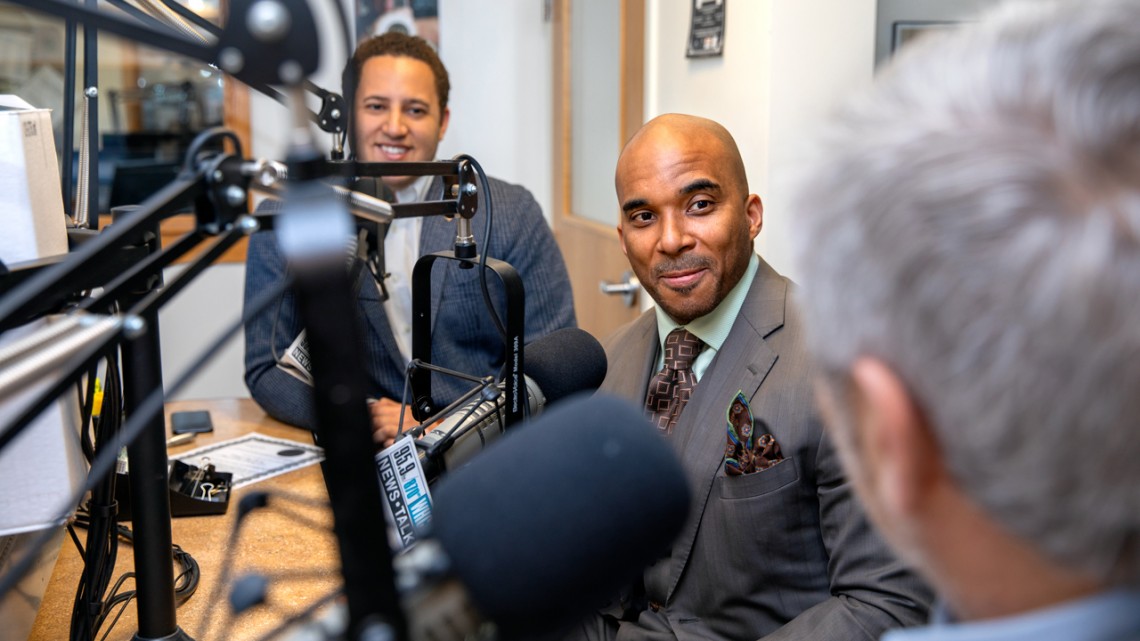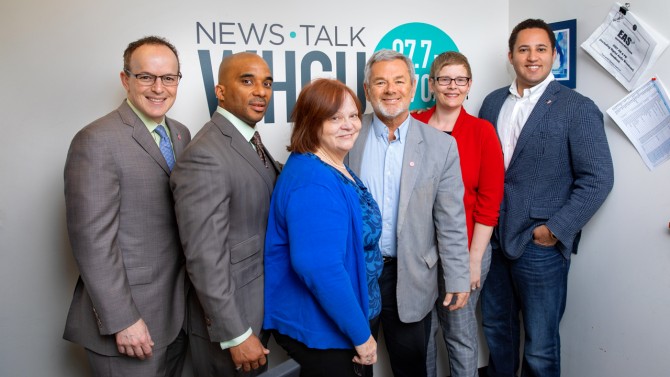
Gary Stewart, associate vice president for community relations, hosts the 600th episode of “All Things Equal” April 23 at Cayuga Radio Group with guests Ithaca Mayor Svante Myrick ’09, left, and Ithaca City School District Superintendent Luvelle Brown.
Civil discourse: ‘All Things Equal’ to air 600th episode
By Melanie Lefkowitz
After 50 people were killed in a New Zealand mosque, Cornell’s Muslim chaplain spoke about the importance of giving Muslims space to mourn as they tried to make sense of the massacre.
When white supremacists marched through Charlottesville, Virginia, Ithaca City School District Superintendent Luvelle Brown discussed his own experience growing up in Charlottesville, as well as his efforts to combat racial injustice.
And after a transgender woman was found murdered at a Collegetown construction site, an Ithaca College LGBTQ leader talked about the death’s impact on Ithaca’s transgender community, whose members not only lost a friend but also face the threat of violence every day.
Since 2007, “All Things Equal,” a weekly radio show co-produced by Cornell and the Cayuga Radio Group, has provided a kind of talking cure for some of society’s ills. Celebrating its 600th episode April 23 with guests Brown and Ithaca Mayor Svante Myrick ’09, “All Things Equal” draws on the diversity of Tompkins County’s communities and campuses to respond to intolerance with dialogue.
The show focuses on issues of diversity, equity and sustainability, and aims to provide an oasis of respect and empathy in what can seem like a sea of discord.
“I think it brings a level of decorum and participation to the community,” said Gary Stewart, Cornell’s associate vice president for community relations. Stewart, Kate Supron, campus community liaison, and Susan Riley, deputy director of community relations, serve as hosts for the show, which airs Tuesdays at 8:35 a.m. on WHCU radio (870 AM) and averages 15 minutes.
“It’s not yelling. It’s a conversation,” he said. “There have been times when people have cried on the air. So have I. I think it’s very human. In an era where there’s so much bad media, I think it’s professional, and I think it’s true to its mission.”
The show began after a spate of racial incidents in 2007 laid bare some deep divides in the community. In an effort to bridge those gaps, and with the support of then-Cornell President David Skorton, “All Things Equal” became a safe, thoughtful space where community members could come together to talk about sometimes difficult topics.
“It’s just too late to start forging relationships in a crisis,” Stewart said. “We started this show to have a steady resource, to talk about issues of equity, diversity and inclusion – which is a broad umbrella. It’s proven its worth many times, sometimes on really time-sensitive issues.”
Stewart, who spent 10 years as the Ithaca Journal’s opinion page editor, approaches the show as a journalist – responding to current events and tapping into urgent conversations. Sometimes this means scrapping recorded programs in favor of live broadcasts to react to something timely, said Chet Osadchey ’88, president of the Cayuga Radio Group, which includes WHCU.
“People always ask me, ‘What do you think is the most important show you’ve ever done?’ And I always say it’s our most recent show, because Gary is always thinking about what’s happening in our community right now,” Osadchey said. “There’s always something that should spark a dialogue and a conversation that allows people to think positively, so they can understand and educate themselves and educate each other.”
Though its core mission is to address current events tied to diversity, the show doesn’t always tackle controversial issues. It often concerns the stuff of everyday life, with topics ranging from upcoming arts events to resources for people in need. Guests have included Ithaca, Cornell and Ithaca College community leaders, as well as students, staff and local residents.
“A lot of times over the years, people have just called me up and said, ‘Hey, can we do a segment on the show?’ I’m always flattered when that happens,” Stewart said.
“It’s not just good for Cornell – it’s a community resource.”
“All Things Equal” has been honored by the New York State Broadcasters Association, the State University of New York Council for University Advancement, the Community Dispute Resolution Center and the Greater Ithaca Activities Center. The show was also recognized when the Office of Community Relations received the Presidential Excellence Award from the International Town and Gown Association in 2016.
Along with Cornell, Wegmans and Cayuga Medical Center have supported the show since its inception; other sponsors have included the Tompkins County Chamber of Commerce, Tompkins Cortland Community College, Ithaca College and the Community Foundation. In addition to those who tune into the broadcasts, around 1,000 people listen to the shows’ online podcasts each week.
“You can’t really act unless you understand,” said Jean McPheeters, who was president of the Tompkins County Chamber of Commerce when it worked with Cornell to create the show. “And I think the show over its 600 episodes has really broadened people’s understanding of who is in this community, what they do and what they deal with on an everyday basis.”
Media Contact
Get Cornell news delivered right to your inbox.
Subscribe

